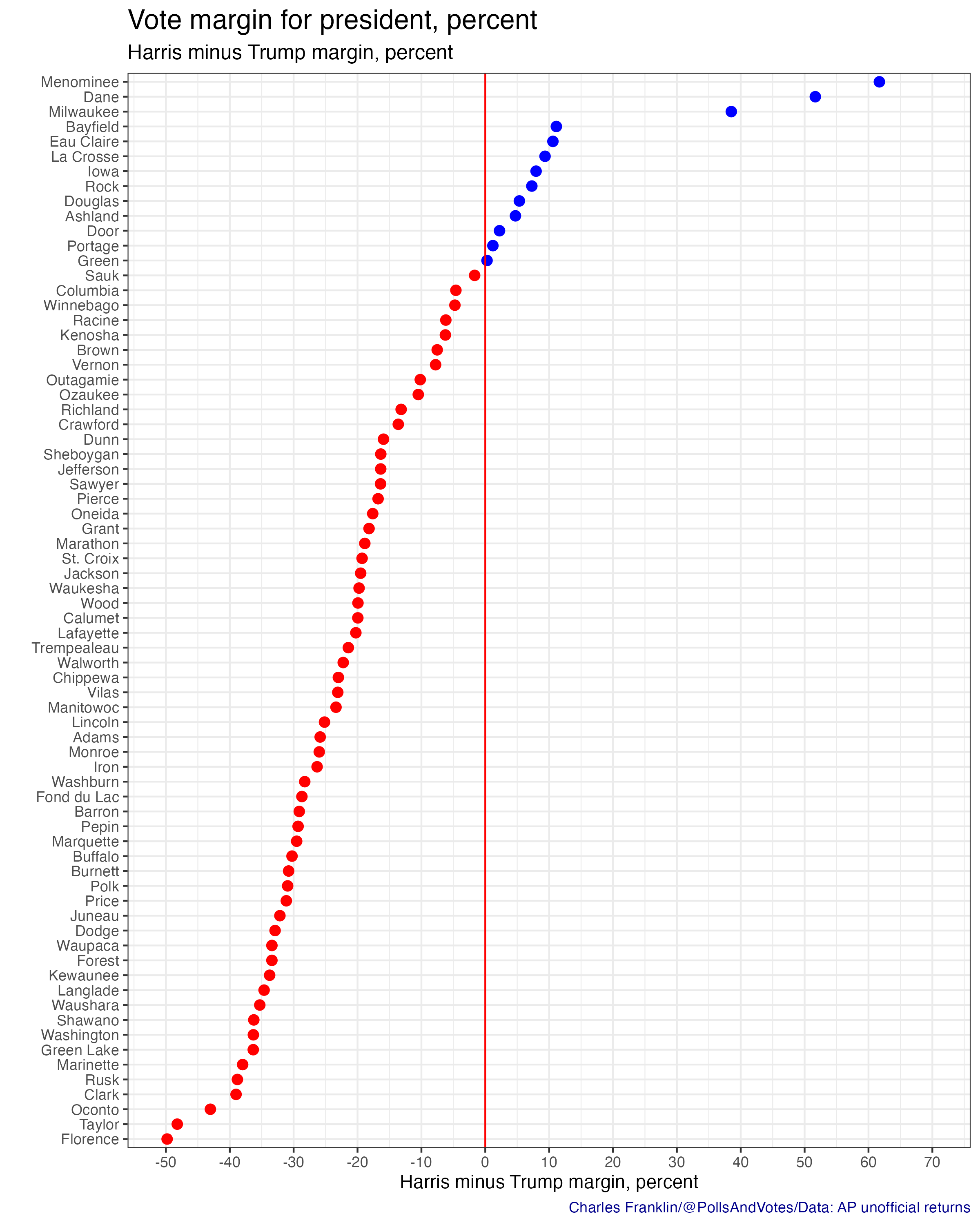Wisconsin in ’24: Marquette Law School researchers share ward-level analysis of state’s vote for president, U.S. Senate
Law Poll director, Lubar Center fellows provide detailed analysis of Wisconsin election results
Nov. 8, 2024
MILWAUKEE – Exceptional depth and detail—that is what researchers at Marquette University Law School and its Lubar Center for Public Policy Research and Civic Education are providing in analyzing the Wisconsin vote in the November 2024 elections. Charles Franklin, professor of law and public policy and director of the Marquette Law School Poll, and Lubar Center fellows John Johnson and Craig Gilbert have analyzed voter data across Wisconsin and brought together the results with discussion of long-term trends to identify factors influencing Tuesday’s election. This release includes links to articles by each writer.
The posts linked below are the first installments in an ongoing series following the recent national election and in the light of the shifting composition of the Wisconsin legislature. By providing data at the level of wards—the most basic electoral division in Wisconsin—this project led by Johnson, Lubar Center research fellow, will allow not only Marquette researchers but journalists and, in fact, any interested individuals to analyze voting patterns and trends in detail with unprecedented promptness.
Future posts will look at state elections and the impact that the new legislative maps had on shaping the makeup of Wisconsin’s State Assembly and State Senate.
How Wisconsin Split Its Ticket Once Again
Written by John D. Johnson, Research Fellow
Marquette Law School Lubar Center for Public Policy Research and Civic Education
Former President Donald Trump won Wisconsin’s 2024 presidential election by just shy of 30,000 votes, after losing the state by 21,000 in 2000 and winning by 23,000 in 2016. Meanwhile, Sen. Tammy Baldwin won re-election by a similarly slim 29,000 votes. This, after Sen. Ron Johnson won his 2022 reelection campaign by 27,000 votes.
While other parts of the country (e.g., New York, New Jersey) saw big swings to the right, Wisconsin shifted more modestly. Trump eked out a win, but not by enough to pull Eric Hovde along with him. Republicans won most of the competitive seats in the State Assembly, likely keeping a comfortable nine-seat advantage. But Democrats swept all four State Senate targets, making them marginal favorites to win the chamber in 2026.
Read the full analysis at the Marquette Law School Faculty Blog and in Johnson’s Blue Book substack.
Wisconsin County Votes for President and Senate
Written by Charles Franklin, Professor of Law and Public Policy and Director, Marquette Law School Poll
Here is a simple guide to the county votes for president and Senate in Wisconsin on Nov. 5, 2024. ….

Where do the votes come from? The Democratic net vote comes with huge margins in Dane and Milwaukee counties, followed by much smaller margins in 11 other counties. The large Republican margins come from Waukesha and Washington. The many smaller Republican leaning counties collectively provide Republican strength, offsetting the fewer counties with Democratic majorities, despite the large margins in Dane and Milwaukee. ….
Baldwin won 14 counties, including Sauk which Trump won, while Hovde won 58.
While Baldwin only narrowly outperformed Harris—winning by 0.9 percentage points while Harris lost by 0.9 percentage points—Baldwin outperformed the presidential ticket in all but four counties: Menominee, Ozaukee, Waukesha, and Washington.
Read the full analysis at the Marquette Law School Faculty Blog.
Donald Trump took Wisconsin in 2024 presidential election by scoring broad gains, and by stemming Republican bleeding in suburbs
Written by Craig Gilbert, Fellow
Marquette Law School Lubar Center for Public Policy Research and Civic Education
In one key respect, the 2024 presidential election in Wisconsin was like most presidential elections in Wisconsin.
The state’s 72 counties overwhelmingly shifted in the same partisan direction—in this case, toward the Republicans.
The full analysis ran in the Milwaukee Journal Sentinel on Nov. 6, 2024
About Kevin Conway

Kevin is the associate director for university communication in the Office of Marketing and Communication. Contact Kevin at (414) 288-4745 or kevin.m.conway@marquette.edu.


